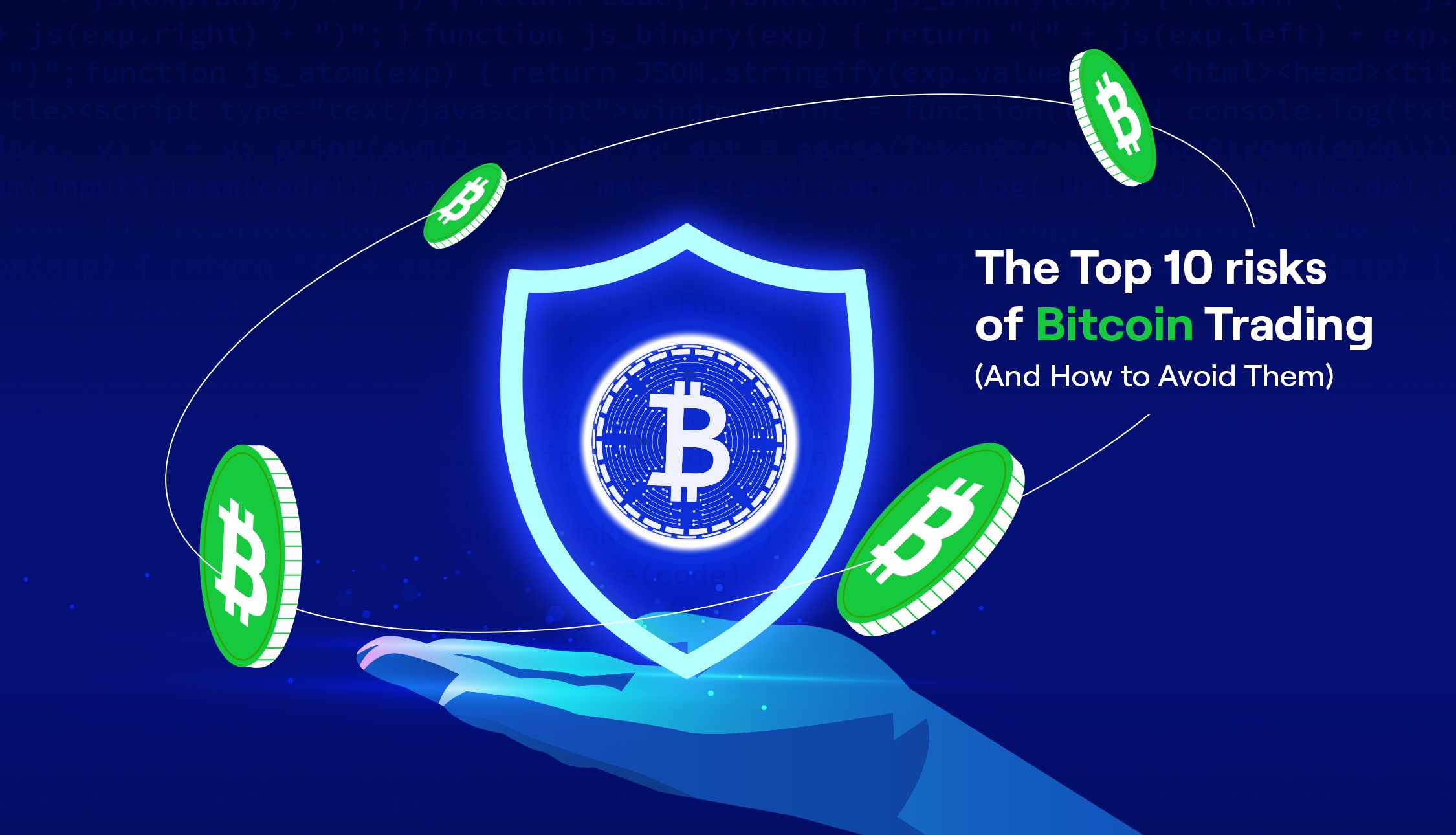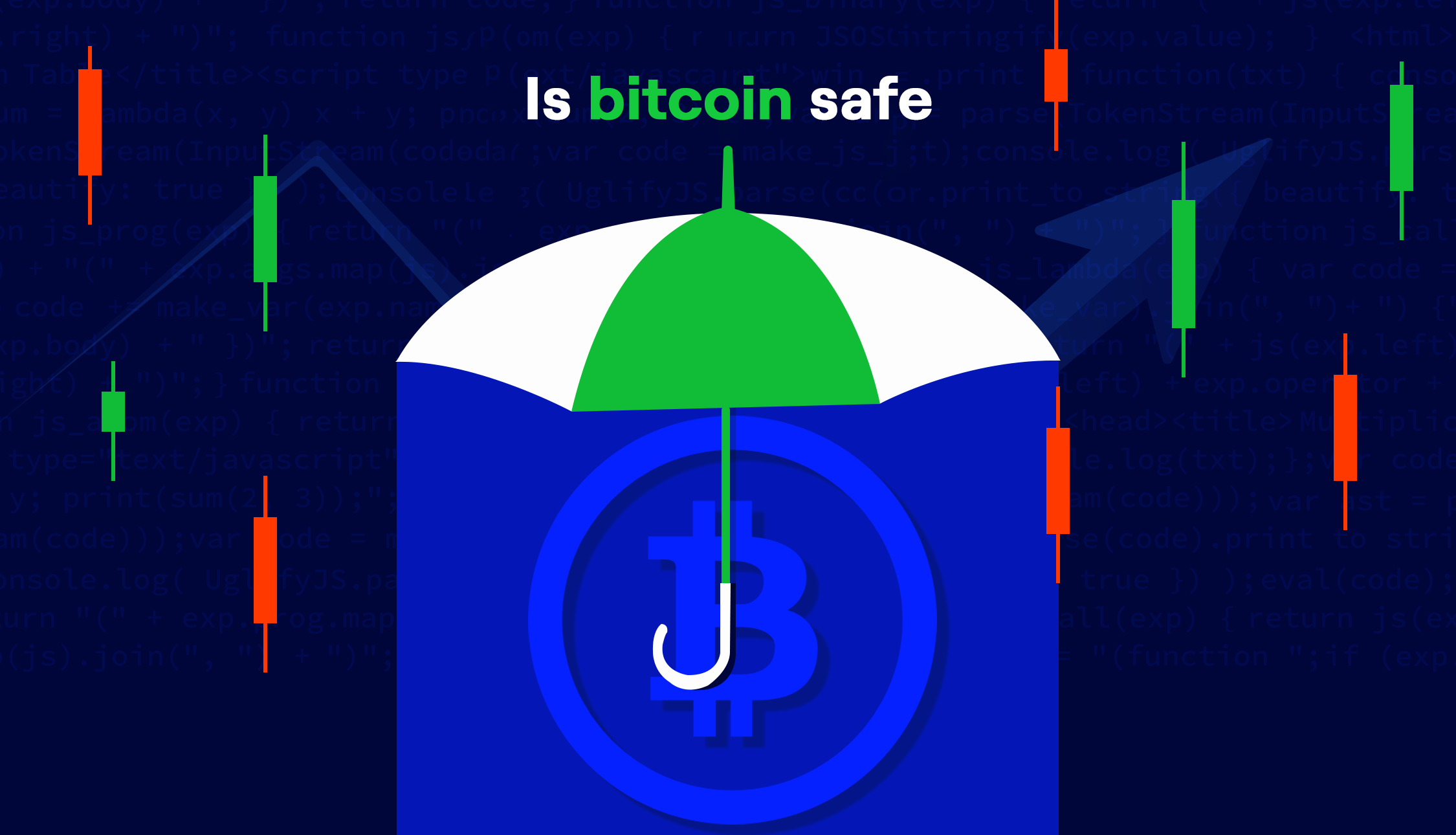
The Top 10 Risks of Bitcoin Trading (And How to Avoid Them)
Bitcoin trading involves a lot of risks that every investor must understand and manage carefully. As the cryptocurrency market keeps evolving, it is crucial to navigate these challenges wisely. In this blog post, we will discuss the top ten risks of Bitcoin trading that every investor should be aware of. We will also provide strategies and precautions to help you confidently and resiliently navigate Bitcoin trading.
Top 10 Risks of Using and Trading Bitcoin
These are the top 10 risks associated with trading Bitcoin:
- Volatility: Bitcoin's price is notorious for its wild fluctuations, offering opportunities and risks. Traders must be prepared for sudden price swings that can lead to substantial gains or losses. Long-term holders should also be mindful of Bitcoin's price volatility when considering it as an investment.
- Security Concerns: Security is paramount in the cryptocurrency realm. Bitcoin users can become targets of hacking, scams, and phishing attacks. Ensuring the safety of your assets requires robust cybersecurity measures, including secure wallets and strong authentication.
- Regulatory Risks: The regulatory landscape for cryptocurrencies varies by country and evolves rapidly. Regulation changes or government actions can impact the legality and ease of using or trading Bitcoin. Staying informed about local laws is crucial to avoid legal issues.
- Lack of Consumer Protections: Bitcoin transactions are irreversible. If you send Bitcoin to the wrong address or fall victim to a scam, there's no central authority to reverse the transaction. Double-checking addresses and practising caution are essential.
- Market Liquidity: Trading Bitcoin on less liquid exchanges can be challenging, as large orders can move the market significantly. Traders should be mindful of liquidity levels when executing trades.
- Taxation Complexities: Tax laws surrounding cryptocurrencies can be intricate and vary by jurisdiction. Failing to report cryptocurrency transactions accurately can lead to legal and financial repercussions.
- Technological Vulnerabilities: Bitcoin's underlying technology, the blockchain, is secure, but vulnerabilities can emerge in wallets, exchanges, or third-party services. Exploits or software bugs can put your assets at risk.
- Operational Errors: Human errors, such as mistyping addresses or forgetting wallet credentials, can result in the loss of Bitcoin. These errors are irreversible, emphasizing the importance of diligence.
- Market Manipulation: The cryptocurrency market is relatively young and susceptible to market manipulation. Pump-and-dump schemes and coordinated trading efforts can impact prices significantly.
- Psychological Factors: Emotional decision-making, driven by fear or greed, can lead to impulsive trading decisions. Emotional trading can result in significant losses.
It's important to approach Bitcoin trading with a clear understanding of these risks and take the appropriate precautions listed below to mitigate these potential challenges.
How to Avoid These Bitcoin Risks
You can lower the risk of using Bitcoin by following these steps:
- Managing Volatility: Diversify your investment portfolio, use stop-loss orders, and set realistic profit-taking targets to mitigate the impact of price volatility.
- Enhancing Security: Utilize hardware wallets, enable two-factor authentication (2FA), and stay informed about the latest security best practices to protect your Bitcoin.
- Navigating Regulatory Changes: Stay updated on cryptocurrency regulations in your country and consider using compliant exchanges and services.
- Ensuring Transaction Accuracy: Double-check recipient addresses before sending Bitcoin and verify transactions on the blockchain to prevent errors.
- Assessing Liquidity: Choose reputable exchanges like Busha with sufficient liquidity for your trading needs, especially for large trades.
- Tax Compliance: Keep meticulous records of all cryptocurrency transactions, consult with tax professionals or use specialized tax software, and accurately report your cryptocurrency holdings and activities according to your jurisdiction's tax laws.
- Enhanced Technology Safeguards: Stay updated on wallet and exchange security best practices. Utilize hardware wallets for long-term storage and ensure you use reputable, regularly updated software wallets.
- Preventing Operational Errors: Double-check all addresses before sending Bitcoin, store wallet credentials securely, and create backups of wallet keys. Consider using multi-signature wallets for added security.
- Staying Informed: Keep an eye on cryptocurrency news and market trends. Be cautious of assets with small market capitalization and high volatility, as they may be more susceptible to manipulation.
- Emotion-Free Trading: Develop a disciplined trading strategy with predefined entry and exit points. Stick to your strategy and avoid impulsive decisions driven by emotions.
Mitigating risk involves being cautious, staying informed, and implementing security best practices. While these steps can't eliminate all risks, they can significantly reduce your exposure to potential problems.
Can you lose money on Bitcoin?
Yes, you can lose money on Bitcoin. Investing or trading in Bitcoin carries inherent risks due to its price volatility and the unpredictability of the market. The value of Bitcoin can rise significantly, allowing for substantial gains, but it can also drop sharply, leading to losses. If you buy Bitcoin at a high price and its value decreases, you could end up with less money than you initially invested. Additionally, falling victim to scams, hacks, or making uninformed decisions could result in financial losses if you're not cautious. It's crucial to approach Bitcoin investment and trading with careful research, risk management, and a willingness to accept the potential for losses.
What You Should Do Next?
Having gained valuable insights into the risks and smart strategies for trading Bitcoin from our blog post, you're now equipped to make informed decisions in the dynamic world of cryptocurrencies. Ready to embark on your Bitcoin trading journey with confidence and knowledge? Join us at Busha today and put your newfound expertise to work. We provide a secure, user-friendly platform to buy and trade Bitcoin effortlessly. Don't miss this opportunity to take control of your financial future. Get started now, and let's navigate the world of cryptocurrency together.
Some Helpful Bitcoin Resources






